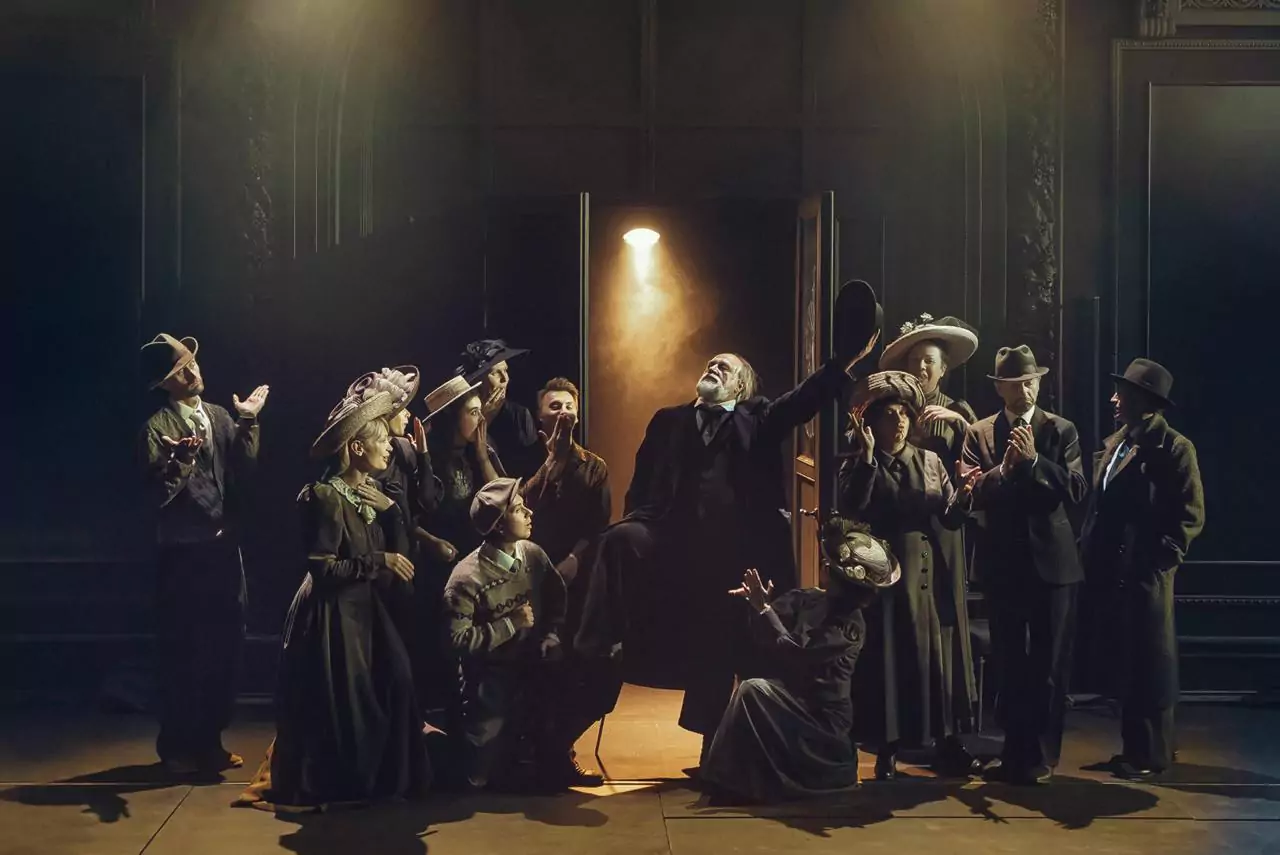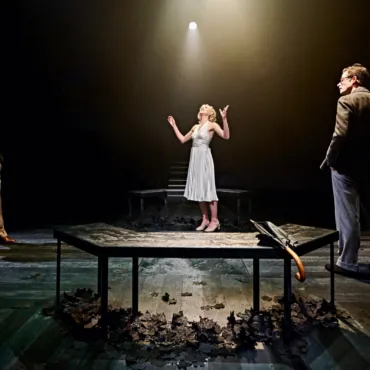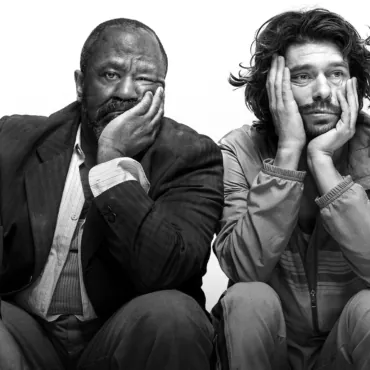This performance is as if woven from the air of childhood, from scraps of memories, from youthful tears. Only Dmitri Krymov is capable of such a thing. He simply takes a plastic bucket and sprays water onto the scaffolding, and then launches colored cars on the wet surface. And now it’s late evening, Gorky Street, flooded with rain and light, and young Dima is walking along it, as he was fifty years ago, and literally crying with happiness. He had just seen “Our Town” staged by the American theater “Arena Stage”. And he was already quite a grown-up guy. And this wet night asphalt, and colored children’s cars rushing back and forth, and these tears, which were enough for a whole bucket – this is the magic of Dmitry Krymov’s Theatre. To emerge from nothing and disappear immediately into nothing.
What shook him most about Our Town back then? It’s hard to say. Probably the precariousness of existence on the edge of the other side of existence, on the other side of the stage mirror. Dima will ask his dad and mom to go to the play. And the three of them will watch it. Dima’s dad, if anyone doesn’t know, was the great director Anatoly Efros, and his mom was the best theater critic of her time, Natalia Krymova. In the play they are just a beautiful young couple: she in a red beret (Svetlana Kuzyanina), he in a fedora (Pavel Drozdov). And between them in the parterre will sit a not-so-young gentleman – their son Dima, who was designated in the credits as “The Leading Man”.
We are all children of our parents. But the children of the great ones are a special and dangerous subject. How many complexes, resentments, claims! And the burden of a famous surname, received at birth, like a general’s epaulettes, which you must carry all your life, justifying yourself, explaining yourself, constantly proving something to someone. As if you have a choice!

The play “All Here” is about the fact that there really is no choice. Everything is predetermined. But there is a short respite, a very small pause between the moment of your birth and eternity, which should be filled with love, joy, play, hugs, kind words. Otherwise, why all this suffering, tears and the inevitability of separation?
And when Daddy waves goodbye with his fedora from the other end of the parterre and Mama rushes to him – that will be the moment for which, perhaps, the theater exists. To evoke tears, to make you live someone else’s life as your own, not afraid to turn on your own memory, like a dusty chandelier in a long-abandoned apartment.
…At first it was surprising to me that out of the numerous and rather motley circle of his parents, Krymov chose a figure certainly noteworthy, but, as it always seemed to me, not the most important – the former director of the Theater on Malaya Bronnaya, Nonna Mikhailovna Skegin. I was well acquainted with her. In fact, she knew all the theater Moscow. Short stature, short haircut, grayish, ironic, prickly. With that smoky contralto of hers, which could be heard a kilometer away. She articulated perfectly, like the actors in the Comédie Française. She understood everything about everyone and didn’t have to choose her words to get her point across. She devotedly served Efros both during his lifetime and after his death, becoming the responsible secretary for his creative legacy. He was for her the main director, the main man, and in general the most important! “Your father was engaged in live theater, and you this plastic c….ney,” – she will say to Dima, when he tries to build something like an altar from an antique chair and electric candles.
Maria Smolnikova played Nonna Mikhailovna in the performance. In my opinion, she made an absolutely wonderful sketch on the theme of serving the Great Theater, the Theater that does not exist and will never exist again. Hence her sparkling evening jacket, as if sprinkled with golden rain. And such an artistic, not at all vulgar swear word, which Nonna from time to time puts on Dima. And the stingy gesticulation a’la Edith Piaf when she sang Non rien re de rien. Real women never repent or regret anything. And why would Nonna regret anything? No, she did not regret, but she wished!
First, it was important, even necessary, for her to let people know the truth about Efros. At any time of day or night for any audience, she was ready to lecture for hours on end about his life and works. At these moments in her woke up a lecturer from the society “Knowledge”, and it was impossible to stop her.
Secondly, she dreamed of being next to Efros and Krymova at the Kuntsev cemetery even after her death. In fact, it was her last wish that after cremation her ashes would be poured on their grave. Everything! No marble plaques or mourning signs. Who knows, knows! Who does not know, will pass by or admire the grave flowers in the summer. But, of course, Nonna would not be a theatrical person if she did not make a lady show out of this sorrowful procedure.
When the small funeral procession, led by the then Chairman of the Union of Theater Workers of the Russian Federation, People’s Artist A. Kalyagin and the chief director of the RAMT, People’s Artist A. Borodin, stood in a circle at the grave, and Dima prepared to fulfill the will of the deceased, it turned out that the urn could not be opened so easily. He confessed to me that he had a rather vague idea about the procedure of scattering the ashes, drawn mainly from Frederico Fellini’s movie “And the ship sailed”, and he did not expect that he would encounter such “resistance of the material”. In order to open the urn and fulfill the will of the deceased, we had to call for the help of Kalyagin’s personal driver, who, fortunately, had the necessary tools in his car.
In the performance, this very real funeral macabre turns into a poignant episode of farewell to the Theater and its faithful servant. Only golden rain slowly falling on the heads and shoulders of the artists. Only a beautiful female voice singing a cappella Mizerrere in the thickening theater twilight. I think Nonna Mikhailovna would have been pleased with it
What else is there to say about the performance “All Here”, whose video version will soon be seen by Zima club members (and everyone else who wants to see it)? It is naive, pure and beautiful. It is made by loving and tender hands. It is a must-see for those who love real theater. Apart from that, there are some amazing acting jobs. For example, Alexander Feklistov as the Assistant Director, who plays sprawling and funky. The way he presents the characters of “Gorodok” can be listened to endlessly. Or Alexander Ovchinnikov, who as the Host is both similar and dissimilar to Dmitry Krymov himself. An intellectual in glasses and a stretchy sweater. Just a few precise details, and the image is found.
There is a lot here, and funny tricks, and hilarious Georgian wedding, and instant actor’s transformations, but all this is warmed from inside with some very warm, almost kindred feeling. As we know, there is no such thing as a lot of happiness. And the performance “All Here” will surely make you happy. At least for one evening.
You can buy tickets for the performance of the play “All Here” by Dmitry Krymov at the link.
